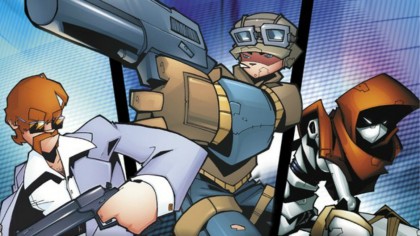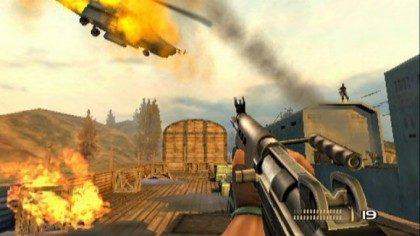How Call of Duty killed the first-person shooter
The lost legacy of GoldenEye

TimeSplitters was unique for a number of reasons but it was its level editor - known as Mapmaker - that really pushed the game ahead of its time.
"The Mapmaker is an interesting one because it's a thing that the publisher always hated because they saw it as a totally non-core feature," says Ellis. "And it required a huge amount of testing which cost them. So they would have all liked us to drop it but luckily we were able to keep it, and particularly with the first one I'm amazed in retrospect that we were able to do that."
Adding a level editor to a console game was a bold step, but in TimeSplitters 2 Free Radical went all out, delivering a game packed with so much content it was more than worthy of sharing GoldenEye's legacy. Unfortunately, the sales figures didn't agree with the critics.
The cracks begin to show
"I think it's a shame that games like TimeSplitters were never as well received as we had hoped, because what we were trying to achieve...we were trying to move away from the tired models of military FPSs [First Person Shooters]."
Times changed. Ironically, Free Radical soon started to afford fewer liberties than Rare did, and Ellis and his team found themselves in a very different industry to the one that gave birth to GoldenEye.
"I always remember when we were finishing Timesplitters Future Perfect getting a visit from Don Mattrick to basically tell us that it didn't matter whether we made the game any good or not," says Ellis.

"We were saying we wanted a couple of extra weeks just to put in some final bits of polish. We realised that the multiplayer had not quite enough attention compared to the previous game and we wanted to finish it off properly.
Get daily insight, inspiration and deals in your inbox
Sign up for breaking news, reviews, opinion, top tech deals, and more.
"And Don Mattrick flew in and explained that if we did that then it's going to move fifty million dollars out of EA's financial year and it's going to hit their share price and actually that's more important than whether our game is any good."
Ellis and his team were learning that business no longer bowed to creativity in quite the same way: "That was my first experience of finding out that your interests aren't really aligned with publishers' interests."
Time to split
But as business went, the proof was in the pudding, and the critical success of TimeSplitters alone just wasn't enough to bring publishers back for more. After Haze for PS3 failed to galvanise enthusiasm, the writing was on the wall for Free Radical and the company went into administration before being bought by Crytek. It's for this reason that TimeSplitters 4 has been dangling in limbo ever since.
We ask Ellis whether he thinks we'll ever see the long-awaited fourth chapter, which Crytek cancelled after it absorbed Free Radical, but there's no good news to be heard here.
"I don't think there's any chance that's going to happen," he tells us. Given his experiences trying to get the game off the ground after TimeSplitters Future Perfect, we can see why.
"I spent a lot of time doing the rounds talking to publishers [about TimeSplitters 4] and the conversations always went the same way. You always got to the point where the marketing person in the room would say 'I don't know how to sell this' because they want a character that they can put on the front of the box."
"In the first half of that company it was easier to get the funding we needed based on critical success because there was always a publisher that thought 'well maybe we can do better than the previous publisher did so we'll take a punt on it," says Ellis.
Hugh Langley is the ex-News Editor of TechRadar. He had written for many magazines and websites including Business Insider, The Telegraph, IGN, Gizmodo, Entrepreneur Magazine, WIRED (UK), TrustedReviews, Business Insider Australia, Business Insider India, Business Insider Singapore, Wareable, The Ambient and more.
Hugh is now a correspondent at Business Insider covering Google and Alphabet, and has the unfortunate distinction of accidentally linking the TechRadar homepage to a rival publication.
